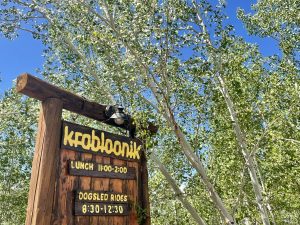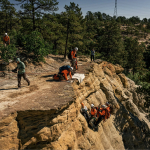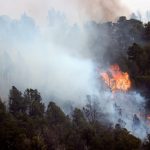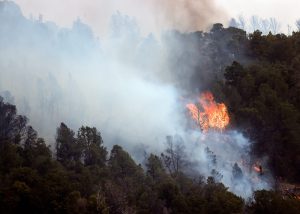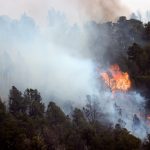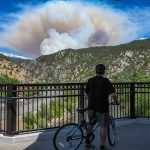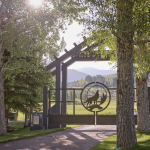Colorado Parks and Wildlife to consider fee increase to better support Backcountry Search and Rescue teams across the state
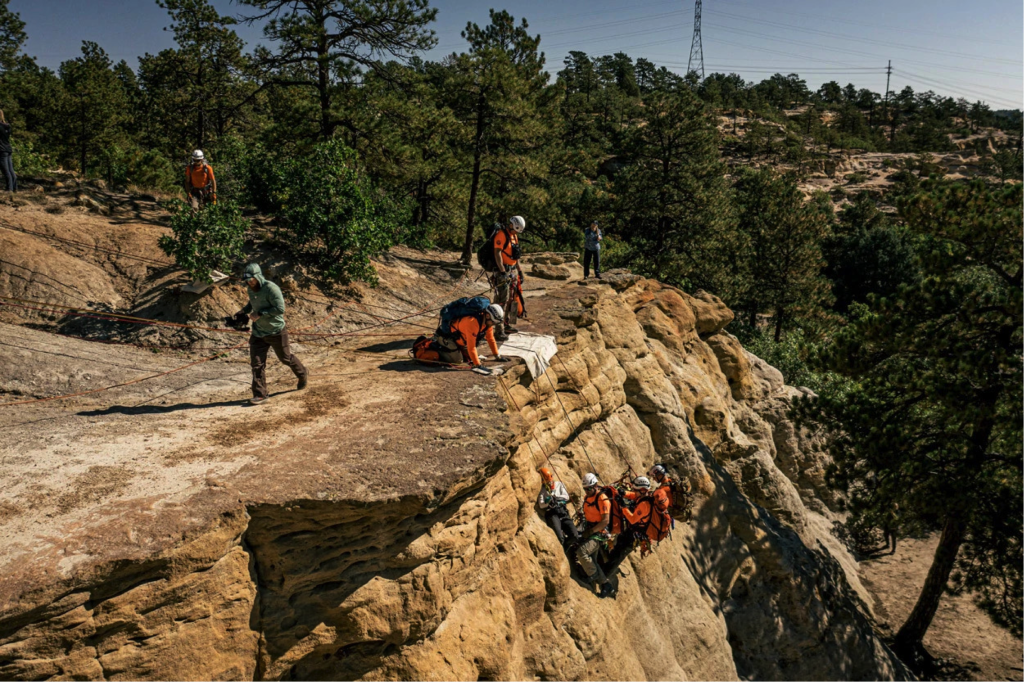
Christopher Dowell, Colorado Parks and Wildlife/Courtesy Photo
While Colorado’s backcountry search and rescue missions have increased significantly in the past few decades, statewide funding for the volunteer-staffed programs across the state has struggled to keep up with the growth.
A proposed fee increase before the Colorado Parks and Wildlife Commission next week aims to rectify this. As contemplated, it would increase a $0.25 surcharge — applied to most Parks and Wildlife licenses and registrations, including hunting and fishing licenses as well as boat and off-highway vehicle permits — to $1.25 to bring it in line with inflation and the program’s needs today.
The growth of Colorado’s Backcountry Search and Rescue programs
Colorado’s first formal mountain rescue team was created in 1947, just after World War II. Since then, with the growth of the state’s population, tourism and outdoor recreation, many more teams have formed.
Today, Colorado is home to around 50 Backcountry Search and Rescue organizations, which are 100% volunteer-based and provide search and rescue services free of charge to individuals lost, injured or stranded in the backcountry.
While these organizations are county-based and coordinated through county sheriffs or county governments, Colorado Parks and Wildlife provides support from the statewide level, including training, funding and a mental health program.
As of January 2022, around 2,800 backcountry search and rescue volunteers were responding to approximately 3,600 search and rescue incidents a year.
Perry Boydstun, Parks and Wildlife’s backcountry search and rescue program manager, likened the service to health insurance: “We don’t know that we need it until we need it.”
While a critical service like other first responder agencies, search and rescue groups often lack the resources of these more traditional police and firefighting departments.
“(Backcountry search and rescue) volunteers are asked to go out at any time of the day, night, leave their families, leave their jobs to volunteer and oftentimes spend their own money doing that,” Boydstun said “And they don’t have the luxuries that some of the other first responders do throughout the state and not wide amount of funding either.”
A 2022 report from Colorado Parks and Wildlife reported that each search and rescue volunteer spends roughly $2,000-$2,500 a year on training and equipment. In total, the volunteers spend roughly $5 million annually. On top of that, the groups require “hundreds of thousands of dollars” in operating costs, vehicles, search and rescue equipment and technology.
Historically, a surcharge placed on Parks and Wildlife licenses and registrations — alongside voluntary purchases of the Colorado Outdoor Recreation Search and Rescue card — has filled Colorado’s Search and Rescue Fund, which allows the state to reimburse local search and rescue teams for rescue operations. At year’s end, the remaining funds are divided amongst the groups to purchase training and equipment. The fund currently generates between $500,000 and $600,000 annually.
Outside of grants and reimbursements from this fund, Colorado backcountry search and rescue organizations rely on varying levels of county funding, federal funding, local fundraising efforts and, in some cases, membership dues.
Setting the stage for the future of Colorado Backcountry Search and Rescue
Legislation in recent years has aimed to help improve how the state supports and funds these programs.
In 2021, this included a one-time infusion of $2.25 million to the program, a mandated study of issues in Colorado’s backcountry search and rescue program and the creation of the Keep Colorado Wild Pass. Once up and running, the Keep Colorado Wild Pass set aside $2.5 million annually for the fund.
Revenue from the Keep Colorado Wild Pass has opened up county groups to be able to make larger purchases — snowmobiles, trucks, ATVs, boats, better equipment — that the traditional search and rescue fund did not allow for, Boydstun said.
In 2022, a new law moved the state’s backcountry search and rescue program from the Colorado Department of Local Affairs to Colorado Parks and Wildlife, made a one-time transfer of funds and authorized the agency’s commission to make a one-time increase to the surcharge placed on various fees and licenses.
During its Thursday, Aug. 21 meeting in Pueblo, the Colorado Parks and Wildlife Commission will hear a proposal to increase this $0.25 surcharge by 400%, bringing the fund’s annual balance to around $2.4 million.
“Twenty-five cents was the original surcharge in 1987,” Boydstun said.
The 2022 legislation authorized Parks and Wildlife to make a one-time increase to the surcharge, only allowing for inflation adjustments after it’s set.
Since then, a few proposals to increase it have been rejected by the agency’s commission, pushing for better stakeholder engagement, Boydstun said.
“So this year, we really focused on our stakeholder engagement, reaching out to all these communities (hunters, anglers, off-highway vehicle users and more) to ask, what are the impacts? How is this going to affect you?” he added.
The feedback on the proposal has been largely positive, Boydstun said.
Increasing the surcharge would help match the increase in demand for search and rescue services in Colorado.
Since 2009, the number of incidents has doubled, alongside the number of volunteers needed to handle the calls and the number of hours spent in training, Boydstun said.
“And when you take that into account — and you look at the populations that are coming out, not just to hike, but there are populations and tourists and folks getting involved in these high-risk industries in incredible amounts — the general nature and risk of the recreational pursuits as well as the safety implications of rescuers has gone up tremendously,” he added.
Having more money in the Search and Rescue Fund would go a long way in helping the state’s search and rescue groups, Boydstun said.
“It’s a tremendous service for Colorado,” he added. “We’re trying to build this (fund) up to be something that teams can rely on and depend upon to make their jobs safe as volunteers.”
After its hearing in August, the Parks and Wildlife Commission is expected to have a second hearing in November. If passed, the fee would be effective starting Jan. 1, 2026.
To learn more about the proposal and the Backcountry Search and Rescue Program, visit EngageCPW.org. To provide public comment on the proposal to the Parks and Wildlife Commission, visit CPW.State.CO.US.
Snowmass reaches preliminary consensus on Krabloonik future
Snowmass Town Council agreed that a dog-park and restaurant could be in the Krabloonik property’s future.

Support Local Journalism

Support Local Journalism
Readers around Glenwood Springs and Garfield County make the Post Independent’s work possible. Your financial contribution supports our efforts to deliver quality, locally relevant journalism.
Now more than ever, your support is critical to help us keep our community informed about the evolving coronavirus pandemic and the impact it is having locally. Every contribution, however large or small, will make a difference.
Each donation will be used exclusively for the development and creation of increased news coverage.

